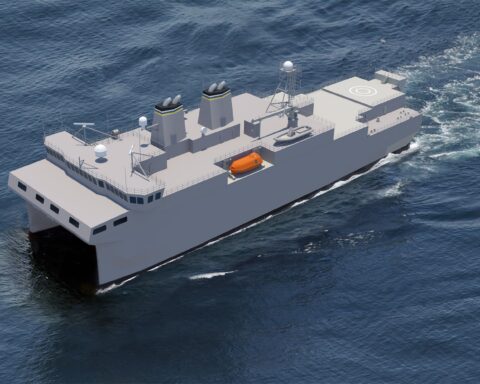The following is the Aug. 26, 2019, report from the Defense Department Inspector General on former Vice Chief of Naval Operations Adm. Bill Moran. Moran was confirmed to serve as the next chief of naval operations but instead retired amid this DoD IG investigation.
Complaint Origin and Allegations
On June 24, 2019, Department of the Navy (DoN) officials referred e-mails from Admiral (ADM) William F. Moran’s personal Gmail account to the DoD Office of Inspector General (DoD OIG) for notification of potential senior official misconduct.
Our investigation focused on ADM Moran’s use of personal e-mail for “official DoD communications” in which he discussed official DoD information with a Navy commander formerly on the Chief of Naval Operations’ (CNO) personal staff, and Navy military, civilian, and contractor employees.
Additionally, we examined whether ADM Moran’s continued relationship with the Navy commander may have been inappropriate. The Navy commander had been previously removed from his position as the Public Affairs Officer on the CNOs’ staff after being held accountable for inappropriate behavior towards junior female officers and a female civilian employee. The Navy commander also had outside employment as a private media relations consultant after he had been removed as the Public Affairs Officer on the CNO’s staff but while he was still in an active duty status.
We initiated our investigation on July 1, 2019.
On July 7, 2019, ADM Moran informed the Secretary of the Navy that he was declining his appointment as the next CNO, and on July 9, 2019, submitted his request to retire from the Navy.
Scope and Methodology of the Investigation
During our investigation, we interviewed ADM Moran and ADM John M. Richardson, the current CNO. We also reviewed relevant documents, including 572 pages of e-mails from ADM Moran’s personal e-mail account that DoN officials provided to our office as notification of potential senior official misconduct.
Conclusions
We determined that ADM Moran used his personal e-mail account to conduct official DoD communications, in violation of DoD policies described in this report.
We found that ADM Moran frequently communicated by personal e-mail with the Navy commander to conduct official DoD communications after the commander had been removed from the CNO’s staff for inappropriate behavior towards junior female officers and a female civilian employee.
We reviewed ADM Moran’s personal e-mails and determined that he used his personal e-mail account to discuss official DoD communications with the former Navy commander and other Navy military, civilian, and contract personnel. The content of these official DoD communications covered a variety of topics, including pending speeches for U.S. Navy ship commissionings and for defense think tanks about force shaping and Navy power projection throughout the world; media articles about sailor retention and Navy personnel policy; future Navy strategies and professional military education; strategic messaging for Navy personnel, industry, and academia; congressional testimony related to Navy readiness and operations; media engagements regarding Navy leadership efforts to prevent future ship collisions; strategic areas of the world where the Navy should increase or withdraw its presence; and ADM Moran’s Senate confirmation hearings to become the next CNO.
ADM Moran admitted to us that he used his personal e-mail account to correspond with the Navy commander and others on official DoD communications. He told us that “convenience was the driver” for his continued use of personal e-mail, both for ease of use and for better “connectivity and reliability” than Government communications systems provided.
DoD policies clearly state that personal e-mail accounts must not be used to conduct “official DoD communications.” Furthermore, convenience is not an acceptable reason to use personal e-mail to conduct “official DoD communications.” We found no evidence that ADM Moran’s use of personal email met the DoD’s criteria for “rare and extraordinary” circumstances, or that he requested or received an exception to policy to use his personal e-mail account to conduct “official DoD communications.” Therefore, we substantiated that his use of personal e-mail violated DoD standards.
Regarding whether ADM Moran’s continued relationship with the Navy commander may have been inappropriate due to the Navy commander’s outside employment as a private media consultant while still on active duty, we found that the media relations firm the Navy commander founded, (REDACTED), had no contractual relationship with the DoD or the Navy, and was not a prohibited source. We found that the Navy commander sought and received ethics guidance from Navy attorneys, who advised him that (REDACTED). In addition, the Navy commander sought and received permission from his commanding officer before engaging in outside employment. We found no evidence that ADM Moran hired the Navy commander or solicited his media relations guidance in the Navy commander’s private capacity, nor was ADM Moran aware that the Navy commander had changed his personal e-mail signature block to contain a reference to the consulting firm he founded. Therefore, we concluded that ADM Moran’s relationship with the Navy commander was not inappropriate with respect to the Navy commander’s outside employment.
With regard to ADM Moran’s continued relationship and communications with the Navy commander after his removal from the CNO’s staff for inappropriate behavior towards junior female officers and a female civilian employee, ADM Richardson and the Secretary of the Navy issued statements of concern about ADM Moran’s on-going professional relationship and collaboration with the Navy commander. ADM Richardson expressed concern that ADM Moran’s continued reliance on the Navy commander for public affairs advice even after the Navy commander was removed from ADM Richardson’s staff showed poor judgment and would send the wrong message to the public and Members of Congress about how seriously the Navy, and the CNO’s office, took the Navy commander’s inappropriate behavior towards junior female officers and a female civilian employee. ADM Richardson also told us that ADM Moran’s actions were contrary to assurances ADM Richardson had given personally to Members of Congress that the Navy commander would no longer be in a position of supervision or influence until his retirement. He stated, “I made it very clear that we, Navy leadership, was not in contact with [the Navy commander]. He was not advising us. He was not in the inner groups. He was not providing strategic or public affairs advice.” ADM Richardson said he was displeased when he learned that not only was ADM Moran conducting “high-level official Navy business” through personal e-mail, ADM Moran also was conducting this business “in an off-the-record manner” with an officer who the Navy had publicly disciplined for inappropriate behavior towards junior female officers and a female civilian employee.
The Secretary of the Navy stated publicly that ADM Moran’s decision to maintain a relationship with the Navy commander “caused me to call his judgment into question.”
We agree with ADM Richardson’s and the Secretary of the Navy’s concerns about ADM Moran’s judgment in continuing to solicit and accept the Navy commander’s public affairs guidance after his removal from the CNO’s staff for inappropriate behavior towards junior female officers and a female civilian employee.
We do not consider ADM Moran’s continued relationship with the Navy commander to be misconduct; rather, we consider it a performance issue. We found no applicable standard that prohibited ADM Moran from continuing his personal or professional relationships with the Navy commander after his removal from the CNO’s staff. However, we agree with the Secretary of the Navy’s and ADM Richardson’s consideration of this issue as a performance issue.
With regard to the use of personal e-mail to conduct official DoD communications, we recommend that the Secretary of the Navy consider any additional appropriate action regarding ADM Moran.
We also recommend that the Secretary of the Navy provide guidance to Navy personnel reminding them of the DoD policy against using personal e-mail to conduct official DoD communications.





